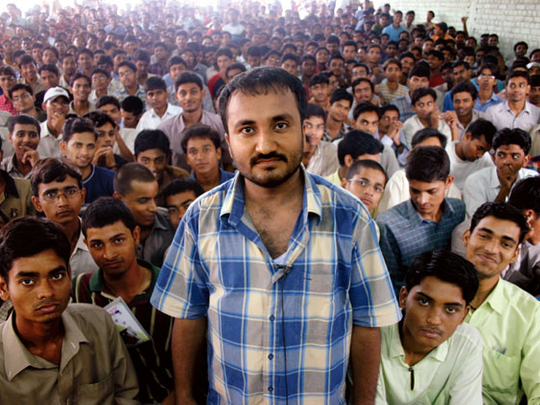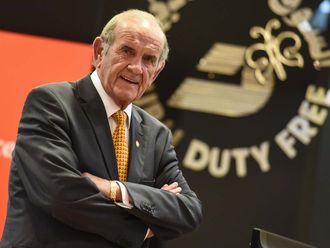
Although I never dreamt that I would one day be known the world over, today I feel proud that my coaching centre, Super 30, has made it to Time magazine's ‘Best of Asia 2010 list'. It is the only educational centre in Asia to have bagged this honour.
At my centre, I provide free coaching, books, food and accommodation for Indian Institute of Technology (IIT) hopefuls from society's underprivileged sections. For the third consecutive year, the institute has secured a hat-trick of sorts - it has achieved 100 per cent success in the prestigious IIT joint entrance examination.
The Indian Institutes of Technology (IITs) are engineering and technology-oriented institutes of higher education established and declared as Institutes of National Importance by the Parliament of India. These were created to train engineers and scientists with the aim of developing a skilled workforce to support the economic and social development of the country.
I was born in Patna, Bihar, a state in northern India.
We lived in a village called Deodaha, 30 kilometres from Patna, the capital. I was a meritorious student and was keen to become a mathematician. I graduated from Patna University in 1994 and was fortunate to have received special guidance by my mentor Devi Prasad Verma, then head, Department of Mathematics, at Patna Science College.
While I was in college I set up the Ramanujan Society of Mathematics - a private coaching institution, named after the famous Indian mathematician Srinivasa Ramanujan. Here I trained students for various competitive examinations at a very nominal fee. I also taught extremely poor students free of charge.
During this time I had also begun contributing papers on mathematics to various national and international journals. I received immense support from my teachers who suggested that I should go abroad for further education.
I would say the roots for Super 30 were laid way back in 1994 when I was given the opportunity to pursue education at Cambridge University in the UK. I was of course, delighted. But once I got over the initial euphoria, I realised that my family's financial constraints were such that I was not be able to accept the offer. I could not expect my father Rajendra Prasad, who worked with the Posts & Telegraphs department, to fund my studies. Incidentally, he died the same year.
I spent several sleepless nights making plans on how to provide a better life for my mother and brother.
I also tried raising money on my own to fund my education, and approached several people including a few politicians. However, my efforts were in vain. The politicians had only advice to offer to me. Gradually, all my enthusiasm for going abroad and pursuing higher education in the UK vanished and I was overcome by a sense of dejection.
However, instead of moaning about it, I decided to seek solace in teaching students who soon started faring well in examinations. Seeing the results of my efforts, I decided to start a new venture. Thus was Super 30 launchedin 2003.
I sought the help of my family to help me in this venture.
I summoned my brother, a talented violinist, from Mumbai. He was entrusted with the responsibility of managing Super 30 while my mother cooked meals for the students, I restricted myself to the academic side. In the first year, 18 out of 30 students from my centre got through the IIT entrance examinations. The next year, the number rose to 22 and thereafter improved further to 26 and then 28. The ‘magic moment', so to speak came in 2008, when 30 out of 30 students cleared the entrance test. And Super 30 became a hit. The feat was repeated in 2009. For this achievement, we found a place in the Limca Book of Records (an Indian version of The Guinness World Records). I never dreamt that the coaching centre would come so far.
From close to 3,000 students who now turn up every year, 200 financially weak but talented students are selected. Of them, 30 are shortlisted and trained. In the past seven years, 212 students from my centre have made it to different IITs in India. The credit for the achievement and success goes to all the students. Some of them studied close to 16 hours a day. They focused on their goals and worked hard to realise their dream.
Teachers who taught me say that Super 30's success is creditable.
Sometime ago I had an opportunity to meet the Prime Minister, Dr Manmohan Singh. I apprised him of my coaching institute and he suggested measures on how the government could take a lead in running such initiatives. The Prime Minister discussed schemes under which coaching could be provided on the lines of Super 30 to shape the careers of poor students.
I requested that reforms in this sector should not be confined to offering coaching programmes to students only for IIT. We needed to do the same in other streams/disciplines as well. I also proposed a number of changes in the IIT entrance examination system.
Meanwhile I have set higher goals for myself.
I am contemplating expanding the institute into Super 60, and then Super 90. The institute does not get financial support from any government or private agency. I also want to set up a residential school for children from the underprivileged sections of society.
Many of my students are pursuing good careers, but during their vacations, they volunteer to teach students of Super 30. It's a fine gesture on their part.
Success after all, means little if it is only for yourself.
It is sweeter when shared. The rough and tumble of life has taught me numerous lessons and I am humbled when people talk glowingly about Super 30.











